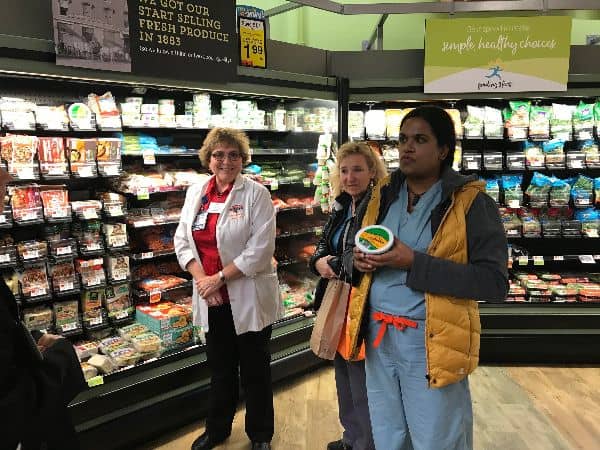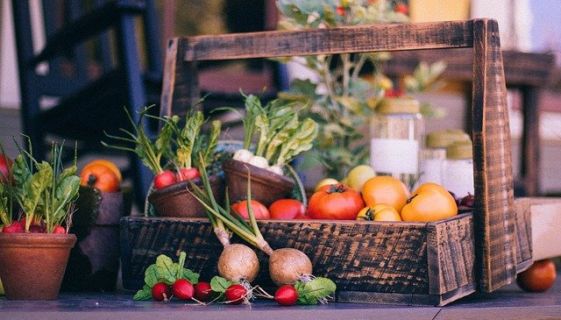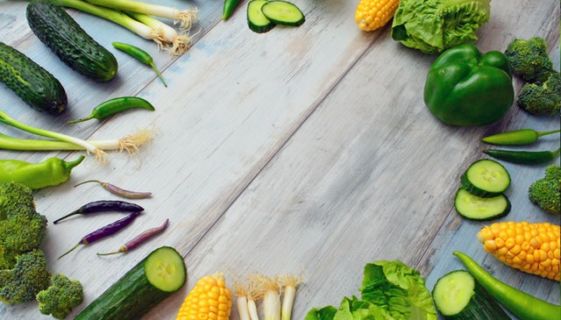Caption: Dr. Roshani Patel leading a (pre-COVID) grocery store tour after her last surgery of the day.
My name is Dr. Roshani Patel (MD, FACS). I am a breast surgical oncologist at Dartmouth-Hitchcock in Manchester, NH.
My patients routinely ask me for help with making healthy food choices, so I decided to set up grocery store tours for them. Selecting healthy foods and figuring out what to look for on labels can feel overwhelming, especially when a cancer patient is in active treatment. Walking the store together, as a group, enables us to look at actual products, to read labels, and to compare and discuss ingredients.
I guide my patients toward a whole foods-based “balanced” plate, which consists of 25% protein, 25% whole grains, 35% vegetables, and 15% fruit. I have noted that my patients who are able to effectively “balance their plate” and add in some exercise during treatment have fewer issues with fatigue, dehydration, swelling (edema) and compromised immunity. Moreover, a healthy diet will supply most of the needed vitamins and minerals and there is less risk of interaction than with supplements. For some of my patients on chemotherapy, taste can be altered and certain foods can irritate the digestive tract. We teach patients how to manage these issues during treatment.
In addition to a decrease in side effects, healthy lifestyle behaviors have other critical benefits to patients undergoing treatment. Notably, many of my patients have also been able to decrease their need for cholesterol, diabetes, and blood pressure medications. Seeing all these concrete positive effects drives me to continue to provide lifestyle guidance to patients, on top of the demands of my surgical practice.
Some tips I advise my patients to keep in mind while shopping:
- Sugar: Reduce added sugar. Keep daily added sugar in foods to no more than 6 tsp for women (24 grams) or 9 tsp for men (36 grams). Read labels carefully—approximately 80% of items in the grocery store have added sugar. Avoid artificial sweeteners, including sucralose, Splenda, Equal, and saccharin. These products increase the craving for sweets and are not good for gut “biome”, the microbial environment in the digestive tract.
- Protein: The average person needs between 40-60 grams of protein each day (the calculation is 0.8 X weight in kilograms). It is possible to get all the protein you need from plant sources. If desired, unsweetened protein powders can be added to mashed potatoes or smoothies. When consuming snacks, try to favor those that are low in starch and include some protein (like edamame, pumpkin seeds, almonds, and nut butters)
- Fiber behaves as food for bacteria that can enhance the immune system in the digestive tract. The interaction between the bacteria and the immune system in the body decreases inflammation and potentially has anticancer effects. Foods high in fiber include beans, broccoli, apples, whole grains, and berries. Ideally, try to consume 20-30 grams of fiber a day.
- Nitrates and nitrites in meat can increase the risk of stomach cancer. If you buy meat, make sure the label says “Nitrate/Nitrite free”. Many processed meats—such as bologna, salami, ham, hot dogs, bacon, and deli meats–contain nitrates or nitrites.
- Electrolytes are important for proper hydration—these can be naturally added to water using electrolyte rich fruits such as cucumber and/or watermelon. Avoid commercial hydrating drinks with artificial color and sweetener.
I hope the next time you visit the grocery store, you’ll keep these few helpful tips in mind.






